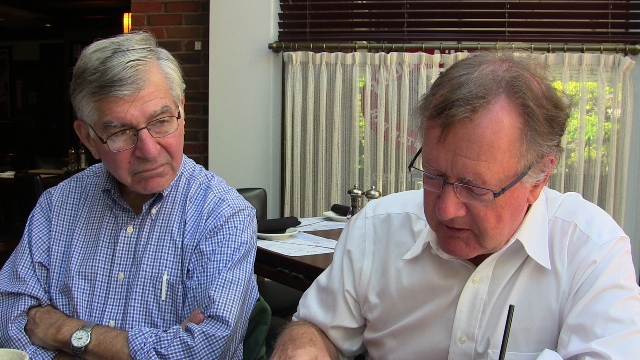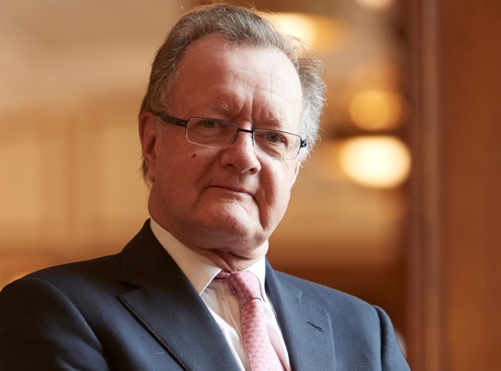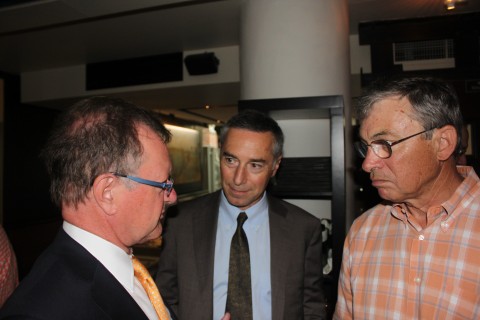
by Admin | Sep 26, 2013 | Highlights
In its September monthly meeting, the Boston Global Forum looks at successful labor-rights implementation models and ways to implement these models in Bangladesh, Vietnam, and Cambodia .

Photo: Arnold Zack (left) with Governor Michael Dukakis at the BGF meeting
The Boston Global Forum has been working feverishly to find pragmatic solutions that can ameliorate health and safety conditions of garment factory workers in Bangladesh. In order to prevent another disaster like the Rana Plaza collapse or Tazreen factory fire, we have garnered support from impassioned government and academic leaders who are committed to devoting their time, knowledge and insight to the cause. In BGF’s September monthly meeting held on September 18, 2013, Governor Michael Dukakis, Arbitrator and Harvard Law School Researcher Arnold Zack, Harvard Business School Professor John Quelch and Co-Founder and Editor-in-Chief Mr Nguyen Anh Tuan met in Cambridge, Massachusetts to share proceedings from the month previous and divulge ideas to accelerate the movement.
Chaired by Governor Dukakis, BGF’s monthly meeting opened with a discussion and analysis of the recent two-day conference held at New York University’s Stern Center on Business and Human Rights on the future of the garment industry in Bangladesh with reference to human rights issues. Major US and European retailers, governmental organizations, Bangladeshi officials and other key players were invited to participate in the conference. In realization of the need to both organize another round-table discussion and to ensure greater participation, Mr Tuan proposed an online conference, organized by BGF, in the coming months.
In this month’s meeting, the crux of the conversation was on the search for model third-world countries where international labor law standards have been successfully and sustainably demonstrated. Rising to the top was the International Labor Organization’s Better Factories Cambodia program. Formerly known as the ‘ILO Garment Sector Project’, Better Factories Cambodia rose out of a trade agreement between the United States and Cambodia in 2001 through which the US assured Cambodia access to its markets in exchange for improved working conditions in the garment industry. The ILO works closely with the Cambodian government, the Garment Manufacturer’s Association in Cambodia and international retailers to ensure safe and conducive working conditions in Cambodia.
Better Factories Cambodia employs multiple assiduous approaches to implement the highest possible safety standards in garment factories. Mr Zack said that the ILO uses a monitoring and evaluation procedure based on 500 different elements addressing fundamental issues like child labor and freedom of unions, and selective issues like over-time wages, maternity leave and protective equipment. The results then feed into extensive reports that detail levels of compliance of garment factories to these factors.
The success of Better Factories Cambodia also lies in its unique labor dispute resolution mechanism- the Arbitration Council. This national tripartite institution is made up of representatives from labor unions, the ministry and factory owners. All labor cases and conflicts are brought before the council that has developed a reputation for fairness and independence. The success of this form of mediation has made the council a model for judicial reform in Cambodia. Such is the triumph of Better Factories Cambodia that “factories from China are now relocating to Cambodia”, said Zack. He adds that retailers are proud of their association with ethical working conditions, in Cambodia, and are not discouraged by being held accountable to international standards.
Despite its success, the Cambodian model has been replicated in only a handful of countries, for instance in Lesotho. Thus far, it hasn’t been applied to Bangladesh. Troubled by the program’s limited expansion, Governor Dukakis raised provocative questions at the BGF meeting: “Why haven’t the U.S. and other interested countries been pushing it? Why aren’t we and others actively advocating for it?” Upon consequent research by the BGF team, it was discovered that the answer might lie in the understanding the transition from a global system of trade quotas called the ‘Multifiber Agreement’ to the WTO’s quota-free trading environment.

Governor Dukakis and John Quelch discuss future steps for the BGF
After deliberating over ILO’s Cambodian model, members of the Boston Global Forum steered the discussion towards other possible strategies to address the ‘Issue of the Year’. One key approach proposed was recognizing the importance of consumer education and pressure in maintaining international standards. Another approach suggested was for BGF to focus on work place safety under the larger aegis of worker rights. Professor Quelch introduced a broad-picture paradigm to the discussion by asking whether BGF should focus on Bangladesh alone or persevere for an all-ASEAN absorption of ILO standards? In support for the Cambodian model, he also suggested that BGF should research the reasons behind the success of the Cambodian model and publish its findings online as a statement of advocacy.
In closing, Professor Quelch reminded the BGF about the need to collaborate with experts in the field by inviting their participation through written commentary and statements on the website. He also proposed actively reaching out to Michael Posner, Labor Rights Advocate and head of the Stern Center for Business and Human Rights to demonstrate our willingness to aid his efforts on the issue.
The Boston Global Forum will work on these propositions in the coming month and will convene for another round of discussions in October 2013. If you wish to join our conversation or participate in our meetings, please send in your request to our Editor-in-Chief, Mr Nguyen Anh Tuan at [email protected]

by Admin | Aug 22, 2013 | Papers & Reports, Highlights
Charles Edward Wilson Professor of Business Administration at the Harvard Business School, John A. Quelch, has several years of industry and academic experience in leadership, corporate accountability and management. Professor Quelch holds a joint appointment at Harvard School of Public Health as Professor in Health Policy and Management and is also a fellow of the Harvard China Fund, a member of the Harvard China Advisory Board and is an associate in research at the Fairbank Center for Chinese Studies. But in addition to his various esteemed roles, John Quelch is also a dedicated Co-Founder and member of the Board of Directors of the Boston Global Forum (BGF). In this interview, Professor Quelch speaks to BGF to describe the pressing need to address worker safety issues and his vision of how Boston Global Forum can do just that.

John A. Quelch
BGF: You’ve traveled and lived in several parts of the world. What drew you to an idea of a forum in Boston? And how do you see a small group of people in Boston making a difference to such large global issues?
Professor Quelch: Boston is a global intellectual hub with thousands of national and international thinkers and scholars in distinguished universities like Harvard and MIT, famous multidisciplinary hospitals and hundreds of public and private sector enterprises. Second, Boston has a large capacity for people, from diverse private and public sector disciplines and experiences, to dialogue on issues. We invariably find that the most important issues of the day, those that are also the most difficult to solve, bridge the public and private sectors and demand collaboration, partnership and dialogue to be resolved. Governor Dukakis suggested differentiating the Boston Global Forum by focusing on one issue each year. So, instead of being a mile wide and an inch deep, we attempt to focus on one particular issue of current and long-lasting significance and one that, given the benefit of heightened visibility through open discussion, could lead to improvement or resolution of the issue. We hope that these discussions will generate recommendations that can guide those associated with policy-making in the private and public sectors.
There are not many researchers focused on this year’s issue- Minimal Standards for Worker Safety- compared to global warming, for example. Worker safety in emerging economies is not something that captures the headlines each day yet it’s very important to the lives of millions of people around the world.
BGF: In prior meetings you have mentioned that the issue of worker safety has been on your mind for a while and that the Bangladesh collapse was “an unfortunate catalyst.” Why were you thinking about worker safety and what made you consider it a pressing issue?
Professor Quelch: I used to be on the board of Reebok, the athletic footwear company, for 12 years before it was taken over by Adidas. During the 1990s, there was concern over conditions at plants in the Far East, where sub-contractors of Nike, Reebok and other footwear manufacturers made very expensive sneakers. A very small portion of the value captured actually went to the workers who made the sneakers. In fairness, the companies responded to the pressure and set up procedures for auditing the working conditions in the factories of the sub-contractors. However, improvements that are made in one industry or one product category don’t necessarily spill over to other product categories where fabrication may be easier or cheaper or more labor intensive, or where the countries involved are very poor. The efforts made by the footwear manufacturers did not apparently spill over to the manufacture of apparel. Beyond the top brands, there are many factories that making cheap apparel for price-sensitive consumers around the world and selling that apparel through private label channels or unbranded channels. There is more reputation risk to a strong brand name if a factory has poor worker safety conditions, but so much of the apparel that is sold is unbranded, compared to footwear.
BGF: My next question is inspired by your latest book Greater Good, how marketing practices can make for better democracy. Based on media reports, the Bangladesh government appears to be too corrupt to make a significant difference to the garment industry even with international pressure. From your understanding, how can international pressure make a positive impact if the government is so corrupt?
Professor Quelch: There are two ways to make a difference. First, consumers have considerable power if they wish to exert it. So one approach is to make consumers more aware of the products that they’re purchasing, where those products come from and the conditions of the workers who make those products. You might call this a ‘pull strategy’. You focus on informing and motivating the end consumer to pull and create a demand for quality and minimum worker safety conditions as a prerequisite for purchase. There are precedents for international labeling or international certification approaches that provide consumers with that information at the point of sale and can inform them as to whether or not that garment is a fair trade garment, where fair trade could be defined as worker safety compliance.
The second avenue is a ‘push’ approach that involves Western governments. Many Western politicians take a serious interest in international worker safety. They can call out the Bangladesh government if it is not doing what is necessary and potentially persuade those firms who contract with Bangladesh sub-contractors to move their business elsewhere to Cambodia or Pakistan, or to other countries that might be willing to comply with and enforce higher worker safety standards in return for securing that business.
BGF: How do you see Boston Global Forum developing and growing and what other issues do you see it addressing in the coming years?
Professor Quelch: BGF will evolve step-by-step. A lot depends upon whether we are seen to make a difference on the issue of the year for 2013. Our goal is to add value by bringing people together in a forum where they have an opportunity to debate alternative approaches to addressing the issue. In the end we’re going to have to demonstrate that we have an impact beyond merely being a talking shop because that’s really not a sufficient point of differentiation.
I personally hope that emanating from our discussions will be a greater involvement of US private businesses or the US government either unilaterally or through international organizations to bring to the emerging economies worker safety standards that are closer to those that American workers enjoy. The US has a responsibility as a leader in the free world, not just as a leader in military or foreign affairs problem-solving, but also as a leader in terms of the values that should guide responsible capitalism. We have the ability to help develop capacity for a fair capitalist model in emerging economies. At the moment, in many parts of the world, the capitalist model of the West is discredited and many point to China as offering a better model for young emerging economies. The US must regain the moral high ground in terms of setting good standards not only for Americans but also for workers around the world. Most American consumers would support this approach even if it cost them a few pennies more at the cash register. When you think about the quantity of apparel that is discarded in the US every week, it isn’t as though people are short of money to buy t-shirts. If it costs a few pennies more to bring a better quality of life to the people who make those products, I think a vast majority of Americans would be open to making that kind of an investment.
BGF has to achieve some demonstrable positive impact on lives of the people that we are focused on. I’m sure that if we are seen to do a good job on this initial issue then there will be a stream of other issues that people will want to propose for similar discussion and follow through.

by Admin | Jul 26, 2013 | Highlights
Boston Global Forum brings together leaders and renowned professors from Harvard and MIT to lead the discussion on worker safety.

Professor Richard Locke (far right) addresses the group as Governor Michael Dukakis (center) and Professor Thomas Kochan listen on.
July 18, 2013 Boston- To propel discussions around Boston Global Forum’s (BGF) 2013’s ‘Issue of the Year’, a group comprising BGF Chairman Michael Dukakis, BGF Executive Director, Nguyen Anh Tuan, distinguished academicians from universities like Harvard and MIT, and representatives from non-profit advocacy groups met last week in Boston to discuss Minimal Standards for Worker Safety . The infamous Rana factory collapse in Bangladesh that killed over 1100 people in April 2013 is the inspiration behind BGF’s Mission for 2013.
Evoking the genesis of Boston Global Forum and its choice of mission for 2013, Governor Dukakis opened the meeting by reminding its participants that BGF was created to reach out to the entire world using information technology to initiate a global conversation around of the issue of the year. This conversation, unlike most others, would be solution-oriented– one that results in a set of recommendations that could be “internationally enforced”. He further added that there was a stark absence of international conversation around the issue of occupational safety, and hoped that the forum could leverage a dialogue “in a way that could build a body of law that is enforceable.”
The meeting addressed several aspects of international worker safety drawing upon examples of supply chain policies, private and public sector arrangements and trade agreements. Richard Locke, professor of Political Science at Brown University and author of The Promise & Limits of Private Power stated that the best success stories, in his understanding of the processes, lie in the combination of private and public sector interventions. While private enterprises are necessary to ensure efficiency (in keeping with their best interest), the government needs to enforce basic enabling rights for workers. “Where you see that combination, that’s where you see success, “ adds Locke. He illustrated his theory with the Better Work Cambodia Program directed by the International Labor Organization (ILO). In this program, the United States used its markets as a “carrot” to drive improvements in working conditions and safety standards. The resulting improvement in worker safety which was made possible by the combined efforts of local governments, private business and the ILO.
The round-table, comprised of American luminaries, rebuked the response of American multinationals to the Bangladesh tragedy. “We’ve got to take advantage of putting pressure on the multinationals and the US multinationals have been slow relative to the Europeans,” said Thomas Kochan, Co-Director MIT Sloan Institute for Work and Employment Research. While European multinationals are putting pressure to change labor law in Bangladesh after the tragedy, American corporations like Walmart and Gap, are withholding involvement with trade unions on the ground or international alliances, he said. Jeffrey Stookey, former professor at Boston University augmented this idea by pointing out that European Union stopped bank loans to Bangladeshi companies that fell short of safety standards. John Quelch, professor at Havard Business School also pointed out that the US has failed in stepping up to this challenge- a behavior that is inconsistent with its reputation of a country that pioneered positive global interventions in the 20th century.

Harvard Business School Professor, John Quelch (left) talks to MIT professors Richard Locke (center) and Thomas Kochan (right).
The Rana Plaza factory collapse draws emphasis to the need to talk about a subject that hasn’t received enough attention. Quelch recalled his experience leading a business school in China to talk about the “less-than pleasant practices” that workers have to endure. He hoped that the Bangladesh tragedy could work as a “catalyst” to stimulate discussions on an often-overlooked issue. Professor Quelch went on to emphasize the need for legislation in bringing about any stringent change in worker safety. “Even with legislation, it’s often difficult to make things stick as well but without it I feel that, personally, it’s going be tough to keep the interest and momentum up,” he said. While addressing human rights concerns, Quelch pointed out that children have, unfortunately, been left out of conversations surrounding the Bangladesh disaster. Rendered helpless by their vulnerability, children are often the worst victims of disasters and calamities.
Incidents like the Bangladesh disaster cannot be averted by enforcing legislation alone. MIT’s Thomas Kochan argued about the need for a bottom-up approach in addressing this subject. He stated that sustained enforcement of labor law could be achieved through the development of local institutions like trade unions, NGOs and coalitions resulting between them.
State laws within the US have attempted to ensure transparency and labor standards in procurement processes, sometimes with success. Liana Fozvog from International Labor Rights Forum (ILRF) and Marcy Gelb from MassCOSH (Massachusetts Coalition for Occupational Safety and Health) described their findings stating that several states and cities across the country have joined a sweat-free consortium that should ideally be instituted at the federal level. In Massachusetts, laws that require disclosure of factories and apparel to be union-made are not always upheld.
Moving Forward
The meeting culminated in dialogue about future actions for Boston Global Forum. Recommendations included a ten-point plan for the Commonwealth to help position Massachusetts as a ‘best practice state’ in the field of worker safety; networking to encourage American multinational companies to participate in future meetings on compensating victims of the Bangladesh disaster; bringing together various stakeholders and actors to talk about solutions that have worked and about governments, private institutions and other organizations that are making a difference; transforming the Boston Global Forum website into an information resource for interested audiences; garnering interest and representation from the State Department or the Department of Labor in BGF’s discussions; inviting Human Rights and Business expert Michael Posner, professor at New York University’s Stern’s School of Business and former official at the State Department to join the forum; and addressing local state laws in Massachusetts that are not being effectively enforced.







